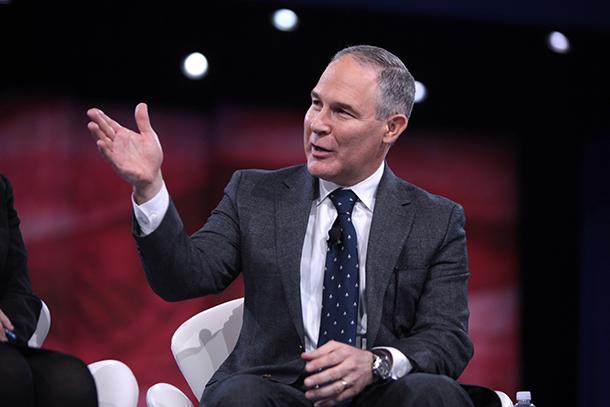How do you run a government agency you have spent so much time suing?
EPA Administrator Scott Pruitt is shown here.
Scott Pruitt, the new head of the Environmental Protection Agency, has sued the agency more than a dozen times. What does that mean for the future of the EPA and for environmental protections in the US?
As the attorney general of Oklahoma, Pruitt chaired an organization of Republican attorneys general who opposed many EPA rules and regulations. Perhaps most famously, Pruitt led a group of states and companies in the continuing court fight against the Obama administration’s Clean Power Plan — a plan crafted by the agency he now runs.
“I think it's fair to say that virtually every environmental rule that came out of the EPA — at least any major rule — Pruitt was involved in as a lead plaintiff or he signed onto a multistate lawsuit that other Republican AG's were bringing,” says Paul Nolette, a Marquette University political science professor.
Pruitt's history has raised questions about whether he has the obligation to recuse himself from certain EPA decisions, due to a conflict of interest.
“It's really not entirely clear because, for one thing, it's not literally the case that he's suing himself, as EPA administrator,” Nolette explains. “Presumably, somebody else will be Oklahoma’s state attorney general at that point; he’s not going to be literally holding both roles. But, he does have a lot of discretion, in the regulatory process [and] in implementation, to avoid carrying out these Obama-era rules.”
Complicating matters further, the Republican Attorneys General Association, which Pruitt chaired, has received nearly $4 million from fossil fuel-related entities. As part of an ongoing lawsuit, an Oklahoma judge recently released thousands of emails which show Pruitt's close ties to the industries he is now in charge of regulating.
According to the The Washington Post, the emails "detail not only how Pruitt’s office at times coordinated with industry officials to fight unwanted regulations from Washington, but also how he was a highly sought-after speaker at conferences and other gatherings for groups such as the American Legislative Exchange Council, which works with corporate interests and state legislators to shape key pieces of legislation."
In several cases, Pruitt filed legal complaints that had been actually written by industry lawyers, not his own office.
This all raises some troubling questions, since “a state attorney general is supposed to represent the state's interests, not the interests of any particular group or industry,” Nolette says. “It’s a legitimate conflict of interest here that, I think, Pruitt would do well to explain."
Nolette expects Pruitt will act to scale back a number of EPA initiatives and transfer many of the responsibilities for environmental protection to the states.
“It's going to be interesting, because I can imagine that Scott Pruitt, as EPA administrator will, in many ways, ask Congress to actually limit the discretion of the EPA to act on a number of issues,” Nolette says. “What you might see is Scott Pruitt calling for Congress to say, ‘The EPA can no longer regulate greenhouse gases’ — actually, in some ways, taking away power from the agency that he leads.”
Nolette thinks states can “take up some of the slack” on environmental issues, but “when it comes to a lot of interstate issues — and a lot of air pollution issues are interstate in nature — or global issues like climate change, it's going to be much more difficult to address these sorts of nationwide and global issues that the Obama administration made a priority,” he concludes.
This article is based on an interview that aired on PRI’s Living on Earth with Steve Curwood.
